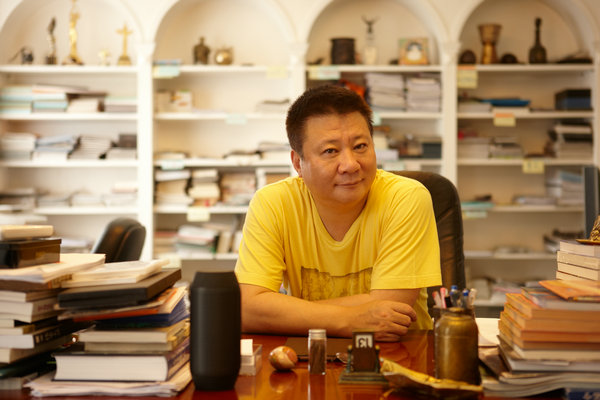 |
|
Zhang Wei, an entrepreneur-turned-director, has made four films on social topics that trigger public debate.[Photo provided to China Daily] |
The four films Zhang has finished focus on sensitive social topics that trigger public debate.
But he denies outside forces have influenced his decisions.
"It's my hard-earned cash that I'm spending. Every cent of it. There's no way I'd mess with my money."
Many scenes of Xi and his mother in The Destiny were shot in two subway cars that Shenzhen's government offered for free, partly because of his reputation. Zhang was previously a deputy of the city's legislature.
He paid all the passengers who appear in the film 80 yuan ($12) per day, which added up to 30,000 yuan daily. Those scenes took over two weeks to shoot, and Zhang loathed the notion of wasting any shots.
"It's money in my left hand, and creation in my right. I can't overindulge," he says.
Zhang is unique among China's big-name directors in that he spent most of his life as a businessman and finances his films with his own company.
He refuses to take money-or orders-from anyone.
"Sometimes, I'm like a kid. Sometimes, I'm like a godfather. I have so many faces that I'm trying to find a way to strike a balance."
Zhang started out as a migrant worker in Shenzhen at age 16, when he left his family in Hunan province's Hengyang in 1981.
His first job was as a salesman. He later started his own business in Shenzhen.
His company, Shidean, was the top producer of video-intercom doorbells and paid more than 10 million yuan in taxes to Shenzhen a year, he says.
He sold a major chunk of Shidean to Legrand, a multinational electrical-installation supplier based in France, in 2006. Other bidders included General Electric and Schneider Electric.
Zhang unloaded his remaining stakes last year to finance his films.
"My previous competitors are worth more than 10 billion yuan now. But I've never regretted my decision. I want to leave something behind after I die," Zhang says.
The Destiny made it to the final rounds of the Golden Mulberry at the 18th Far East Film Festival but lost to A Melody to Remember, a wartime drama directed by Lee Han from the Republic of Korea.
Back in his studio in Beijing, Zhang says he has received invitations to screen The Destiny at international film festivals in the United States, Russia, India, Italy, among other places.
He's talking with several charities that help autistic people. He has pledged to donate all revenues from the film to them.
In the meantime, he's negotiating the details of the domestic release.